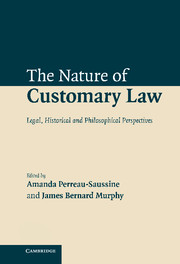Book contents
- Frontmatter
- Contents
- List of contributors
- Table of cases
- The character of customary law: an introduction
- Part I Custom and morality: natural law, customary law and ius gentium
- 1 Pitfalls in the interpretation of customary law
- 2 The moral role of conventions
- 3 Habit and convention at the foundation of custom
- 4 Custom, ordinance and natural right in Gratian's Decretum
- 5 Vitoria and Suarez on ius gentium, natural law, and custom
- 6 Custom and positivity: an examination of the philosophic ground of the Hegel–Savigny controversy
- Part 2 Custom and law: custom, common law and customary international law
- Index of names
6 - Custom and positivity: an examination of the philosophic ground of the Hegel–Savigny controversy
Published online by Cambridge University Press: 30 June 2009
- Frontmatter
- Contents
- List of contributors
- Table of cases
- The character of customary law: an introduction
- Part I Custom and morality: natural law, customary law and ius gentium
- 1 Pitfalls in the interpretation of customary law
- 2 The moral role of conventions
- 3 Habit and convention at the foundation of custom
- 4 Custom, ordinance and natural right in Gratian's Decretum
- 5 Vitoria and Suarez on ius gentium, natural law, and custom
- 6 Custom and positivity: an examination of the philosophic ground of the Hegel–Savigny controversy
- Part 2 Custom and law: custom, common law and customary international law
- Index of names
Summary
Introduction
In December 1812 things seemed to get out of hand in the legal faculty of Berlin University. Its most celebrated jurist, the aristocrat and leading light of self-confident metropolitan Prussian culture, Friedrich Carl von Savigny, threatened to resign from the faculty. It is hard to overestimate the weight of this threat. Since his early masterpiece, Das Recht des Besitzes (On the Rights of Possession), Savigny had been hailed the new pontiff of Roman Law. His students admired him endlessly, some even likened him to Christ. And, if ever this Olympian was to throw his high-born contempt at someone, the object of Savigny's anger would surely have had to play possum – or so it seemed. Not so Eduard Gans: this offspring of a Jewish banking family had originally attempted to join the faculty of law in Berlin, but at Savigny's instigation he was denied the possibility, arguably because of his Jewish background. Gans had originally been confident that he could rely on the Prussian emancipation edict of 1812, but Savigny had written his reports to the Prussian ministry of culture arguing for the impossibility of appointing a Jew to the law faculty, and, at some point, the relevant passage of the emancipation edict was rescinded by royal cabinet order, on request, of course, of the influential faculty of law. Because of these events, it was not hard to guess what kind of enemy Gans would become.
- Type
- Chapter
- Information
- The Nature of Customary LawLegal, Historical and Philosophical Perspectives, pp. 125 - 148Publisher: Cambridge University PressPrint publication year: 2007
- 2
- Cited by

